Tenor Ramón Vargas
In Conversation with Bruce Duffie
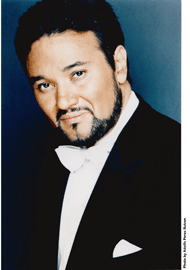
Tenor Ramón Vargas
In Conversation with Bruce Duffie

While casual fans continue to be fascinated with The Three Tenors and detective-types watch to see movement in the line behind them, the true operatic aficionado enjoys the talent which presents the artform night in and night out. Among those who are rising to the top is a handsome young Mexican named Ramón Vargas. He has the talent and the stamina to make it in this crazy world, and has managed to keep his composure in the glare of the spotlight.
Working steadily around the world, Vargas has continued to perform well and progress as his voice dictates. Growing into the larger roles at an even pace, he maintains the lightness and clarity necessary to present the sound and character of each role. One such will be the title role in Rossini's version of Otello, being presented by the Opera Orchestra of New York in Carnagie Hall on January 17 of 2007, conducted by Eve Queler.
Looking back at few seasons, in the fall of 2000 Vargas was in Chicago
for a new production of Verdi's favorite Rigoletto at Lyric Opera.
It was during that run that I had the pleasure of meeting with the tenor in
the offices of the company. Vargas was very animated throughout our
chat, and spoke English quite well. While correcting a few grammatical
errors, I have tried to leave a lot of the flavor of his exuberant speaking
pattern. Here is what transpired during that animated half-hour . .
. . .
Bruce Duffie: You're here in Chicago to sing the Duke in Rigoletto. Is that a role that you have sung often?
Ramón Vargas: Yes, very often.
BD: Do you like coming back to roles that are familiar to you?
RV: Yes, because you have the possibility to make these characters more mature. And this takes time. This is my first Rigoletto for some years. The last time I sang it was maybe seven years ago, and now I understand it is very different in every part of the opera.
BD: Do you make sure that each role grows as you perform it?
RV: Yes. That's supposed to be like this. As artists, we have to do it like this. If not, it's very boring to sing always the same, in the same way. It's very important for us to be looking for other things always.
BD: As your voice matures, are there some roles you have dropped from your repertoire?
RV: Many of the very high roles I don't sing any more because I don't feel it in my voice. For example, operas like La scala di seta or L'italiana in Algeri, or La Cenerentola of Rossini, and others like Bellini's Beatrice di Tenda. These are roles that I don't sing any more. It's not because they are difficult, it's because they are not good for my voice. The Duke of the Mantua in Rigoletto is a very difficult role, but it's okay for me, and I do it.
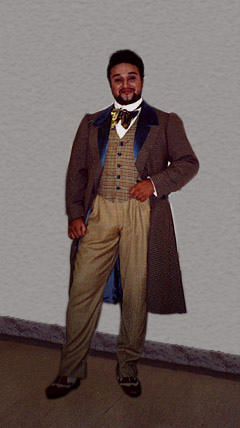 BD: Then, how do you decide when you're offered a new role?
BD: Then, how do you decide when you're offered a new role?
RV: Well, sometimes you have to take the challenge. For example, for me, my first Bohème was a challenge. Other people said, "No, don't sing Bohème, because you are a real bel canto singer. Don't do it." And then I did, and it was nice, and now I sing Bohème all around the world. And this happened again with Riccardo in Ballo in maschera. They said no, so I have to sing it! I try, because there are roles that are supposed to be in your voice perfectly and they aren't, and there are roles that supposed not to be good for your voice, and they are good for your voice because you've got the feeling, because you have the sympathy with the person, with the personality of the role. And, of course this helps. This is not only singing. Singing is one part of the art. The stage, the feeling, being together with the role. This is also very important.
[Photo at right: Vargas as Lensky]
BD: Your range imposes certain roles on your voice. Do you like those characters?
RV: Yes. Yes, I do. At this moment of my career, I don't sing anything that I don't like. Before, sometimes I sang things because I had to, or because I wanted to, because I tried. But now, in this moment, I sing the things that I like and that I can do well, because I feel it.
BD: The characters that you play are mostly young lovers.
RV: Yes, because my voice is very romantic. It's in the romantic way. This means I have to sing these types of roles.
BD: Do you ever wish that you were playing an evil character or a devil?
RV: Yes, why not? Now, for example, in our production here in Chicago of Rigoletto, it's not a traditional Duke. He's a little bit more devil, more bad. It's different, and I like it. I like to change and to try new forms, and new ways.
BD: So you like doing new productions to get new ideas from the stage director?
RV: [Without hesitation]: Yes. Absolutely. I felt these ideas in this production are very brilliant. Not all the people like it, but I think the ideas, and what is inside of this production, are very interesting.
BD: Have you ever been in a production which has gone completely contrary to what you think the character should do?
RV: Yes, that's happened sometimes. In some cases it's better to say, "Thank you very much, but I don't do it." But that is difficult. Normally, it is easier to work with professional people. I speak about things to the stage director and the conductors. You go and you tell them what you think and how you feel. You speak together, and you find something together, to do the music to lead the heart. For example, in this production, Mr. Alden (the director) wanted a really very bad person in the Duke. He wanted the character absolutely not sympathetic. And I said I feel the opposite. I think that he was a nice man that abused the power. He was used to it and he lived all his life like this. But Alden convinced me about his ideas for this production and working with him was a very good experience. I understand what he wanted. Normally when you speak with people in this way, you don't have problems.
* * * * *
BD: Do you like traveling all over the world singing?
RV: [Takes a breath and thinks for a moment.] Until now, yes. I don't know if I will like it all my life, but until now I enjoy it.
BD: Do you leave enough time to rest and stay home, and study new roles, and just get away from it?
RV: Not enough. There is not enough time for this. But now I am looking for this. When I finish a production, I am looking go at home at least two weeks – 10 or 15 days - and stay there with my family, with my wife, with my son, and have a little bit of rest, and then go on. Recharge the batteries. [Chuckles] I think it's important. Of course, it’s not always possible to do it in our career. But now I think I can do it.
BD: Do you change your technique at all for the size of the house? For a big house, or a small house?
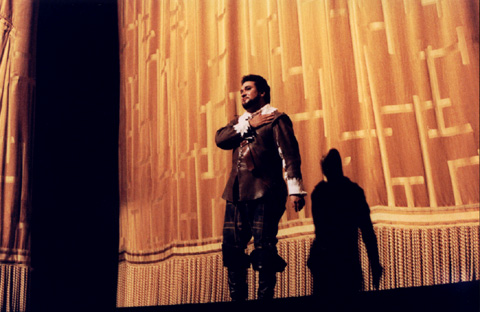
[Vargas as Edgardo]
RV: No, I don't think really you have to change the technique. I have to tell you something: I never forced my voice, and I don't pretend to force my voice. This means if you project well the voice, normally, the size of the theaters are more or less correct. This theater in Chicago has a good acoustic. The Met in New York is a good acoustic. If theaters are too big they could have a good acoustic. Especially in the United States we have this problem with these huge houses. This is against some types of music, some types of operas, like bel canto. Many operas are very intimate. In order to convey this in a large house, it's like... you have to feel sad, and you want to cry, but you have to cry in the middle of the street like a crazy man, rather than going into a corner and crying for you alone. You have to over-reach. It's difficult to find this way, this balance, in these huge houses. And, of course, some operas are perfect for the large houses, such as Aïda, or Pagliacci, these kind of operas in the verismo style. Some operas by Berlioz are in that very "grand opera" style, but many bel canto operas are difficult to do in this size theater.
BD: You're moving into the heavier Verdi roles, so are you looking forward to maybe doing Radamès or Don Carlo eventually?
RV: [Answers immediately]: Don Carlo, yes. Radamès, I don't know. I enjoyed hearing it sung by Franco Corelli.
BD: Do you feel that you're part of a lineage of tenors?
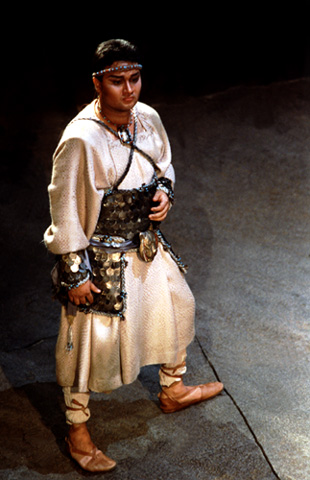 RV: Yes, absolutely. I like feeling like this. Some
years ago, maybe five or six years ago, people said that after The Three
Tenors nobody's coming. The generation has stopped and blah, blah,
blah. Then I spoke with Giuseppe di Stefano. I am a good friend
of him, and he told me it's always the same. He said that when he started,
people said, "Yes, now Beniamino Gigli was the last of the great generation
of singers."
RV: Yes, absolutely. I like feeling like this. Some
years ago, maybe five or six years ago, people said that after The Three
Tenors nobody's coming. The generation has stopped and blah, blah,
blah. Then I spoke with Giuseppe di Stefano. I am a good friend
of him, and he told me it's always the same. He said that when he started,
people said, "Yes, now Beniamino Gigli was the last of the great generation
of singers."
BD: [Laughs.] And when DeReszke stopped singing, the critics lamented about this young, unknown guy named Caruso.
RV: Yes. I don't believe in these things. The opera is healthy. The opera is going well. The opera lives. We don't need any special person. The opera needs only singers that are honest about what they doing. We discuss this a lot.
[Photo at left: in Rossini's Mosè]
BD: You are always honest when you sing?
RV: [Confidently and without hesitation]: Yes, I am. I am absolutely honest. That’s what I do, I sing.
BD: Is there ever a chance you would give too much of yourself, in a part?
RV: No. I think I am honest in what I do. This means I am prepared for what I am doing. I don't sing something that I don't feel I can do, and that means to do it well. It is very important for us to have respect for the public and for the music.
BD: Are you conscious of the audience when you are singing?
RV: [Thinks for a moment.] Yes. The audience in the United States is different than other places. Here it's spontaneous. Sometimes in Europe you feel like you’re on trial. I love Italy, but they are too much pretentious and they think because the opera started there and they have theaters with hundreds of years of tradition, they pretend to be the only ones that have the art of singing in their ears. And this absolutely not correct. In any case, our job is very difficult, and our art is very difficult, because it's very subjective. Many people want to go to the museum to see the opera, and to hear the opera like in a museum. Because one day Maria Callas did this, all the singers that come along have to do it in the same way. Why? That was the way of Maria Callas, and with her time, with her fame, and et cetera, et cetera. Now we are a different generation. We have to find our direction, our way. Sometimes when you read the critics, they write that "Nobody can sing this like so-and-so." They never say, "Okay, it's like this now."
BD: Forty years from now will they say, "Oh, they don't sing it as well as Vargas did so long ago?"
RV: I am sure not! [Laughter.] I am sure that in the future will come a lot of people that can sing very nice, and very well. I hope so because it's the life of the opera. This is the way of the art, of the music.
* * * * *
BD: Thinking about the characters that you sing, are there any of the characters that are perhaps too close to the real you?
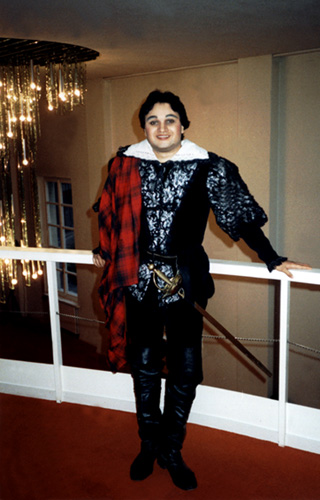 RV: I feel very close with Edgardo in Lucia. This
noble man, with his home stolen. I feel myself close to him.
In many, many ways I am like Werther also. This man is not happy
with what happens around him, and he's very neurotic. I think I am
also a little bit. [Laughs] Maybe all the singers, we are a little
bit neurotic. And then I feel also very close with Nemorino in Elixir
of Love, because it's one of the very few operas when you want to show
the real values of life. He wasn't rich, he wasn't strong, he wasn't
too handsome. He was an honest man with a big heart, and he won the
girl. This was very nice. It's a very nice opera in this way.
Just few operas are like this. He won her love because he was honest.
In many operas, you see very often the power, the money, many different basic
human things. In this case it's different. It's nice and I like
it.
RV: I feel very close with Edgardo in Lucia. This
noble man, with his home stolen. I feel myself close to him.
In many, many ways I am like Werther also. This man is not happy
with what happens around him, and he's very neurotic. I think I am
also a little bit. [Laughs] Maybe all the singers, we are a little
bit neurotic. And then I feel also very close with Nemorino in Elixir
of Love, because it's one of the very few operas when you want to show
the real values of life. He wasn't rich, he wasn't strong, he wasn't
too handsome. He was an honest man with a big heart, and he won the
girl. This was very nice. It's a very nice opera in this way.
Just few operas are like this. He won her love because he was honest.
In many operas, you see very often the power, the money, many different basic
human things. In this case it's different. It's nice and I like
it.
[Photo at right: as Edgardo]
BD: Is opera real life?
RV: [Thinks for a moment.] No opera is not real life, but you can learn many things from the opera. I remember in 1994, I did my first Rigoletto at the Met. For the dress rehearsal a lot of school children came, and they were prepared. They prepared for it in the school. They spoke about the opera, and then after the rehearsal, in the next week I received a lot of letters from the children. They were between nine and twelve years old, and very spectacular things happened. I remember some of these letters. One was very clever, and she asked my character, the Duke, "Why you see only the superficial part of the ladies?" Interesting, eh? Another said, "I don't understand why you are only looking at the people." And then another said to me, "I don't understand why Gilda made this sacrifice for this stupid man.”
BD: [Chuckles] They're very perceptive!
RV: Very perceptive. And I answered them, "You understand perfectly the opera!" Opera teaches you the things that you have to do and the things that you don't have to do in real life. Now you have this and you learn it, now you use it. And this was nice. They understand perfectly! And this answers your question.
BD: Should everyone come to the opera?
RV: [Thinks for a moment] The opera is very generous. There are people who come to the opera only to hear singing. Others come to see the historic works. And there are people that come only for one aria. And then there are people that come for one person, for one singer. In any case, every reason you choose to come to the opera is good! Of course, if you are more prepared, you will enjoy more of each opera. If you spend a few minutes reading about the opera and its history, then you will be more involved in the performance. It's a very fascinating world. I can understand that some don't like the opera. Okay! But one day you have to really try to understand it. Some people say they don’t like certain foods, but after they sample it, the do like it. I think life is like this.
BD: Hopefully more people will like opera, when they taste the opera.
RV: I think so. Singing is very hard way of expressing the art. It is very spontaneous, and it's very direct. There’s a special energy that comes from the singing, and the people are very attracted about it.
BD: Do you sing concerts too, or just opera?
RV: I do concerts. Not too often, but I do, and I like it. I sing Liederabend, songs of Schumann, Schubert, Brahms, Strauss.
BD: Do you like singing with piano?
RV: I like it. It's a very pure form to sing. They have a special energy around them.
* * * * *
BD: You've dome some recording. Do you enjoy making records?
RV: [Ambivalently] Yes, but I am also a little bit anxious when I do the recording, because you know you are doing in the moment, and then, when you finish, you think, "Oh, my God, I could make this another way, so why didn't I?" But I think it's a good time for me to do records, because I am following the natural careers like 40 years ago, when the people that make the records were the people that, throughout their career, as they mature in their art and fame for the stage, they arrive to do records. It bothers me that now, in our time, people sing for half an hour, and they have records. You need the time to learn, to be mature, and then to have this experience. Only later can they say, "Now I have to put my experience in the recording. I am surprised about this phenomenon, but of course the times change, and I understand also this.
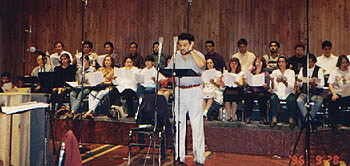
BD: Are you pleased with your records so far?
RV: Yeah. I think all the records that until now I did I like. I am proud about them.
BD: You've done a couple of French roles, such as Werther, and also Favorite in the original French.
RV: This is very interesting. Favorite is the original version, in French. It's a little bit more logical than the Italian version. The Italian version is very, very hard to understand. Nobody understands what's happening there because they change everything. In this case the music and the words are perfect in the French version. Of course, I like the Italian version, but I like more the French version. It is more correct The recording I made of La Favorite with Vesselina Kasarova is very beautiful, and very sensitive. She does an incredible job with the role. And I also try to do a very nice personality of this Fernando… Fernand, in this case. He is very passionate and a little bit ingenious. I like it and I am very proud about this Favorite.
BD: And of course it is Donizetti, so that fits your voice very well.
RV: Yes. All these Donizetti phrases, these long phrases, I just think are very good for my voice. This helps me. My voice is round and nicer when I sing this kind of music.
BD: Your voice is developing. Is it getting stronger and deeper? Is it getting bigger?
RV: I don't know. It's a little bit all of those things together. The only thing is that I must be sure the voice doesn't lose the flexibility. That's the thing that I am looking for. I think if I am able to keep the flexibility in the voice, I will sing in a healthy way for many years. And I must be careful because I am singing a few more dramatic roles. I don’t want my voice to get hard and lose the flexibility. I think it's very important.
* * * * *
BD: Where is home for you now?
RV: Home is Mexico, but I am a Swiss resident. However, I spend a lot of time in Mexico with my wife and my son. Switzerland chose me. When I came to Europe, my first international contract was in Luzern, in this small theater in Switzerland. And I still live there, and I am very happy to be there. They are very nice people, and they help me a lot.
BD: Have you learned to yodel?
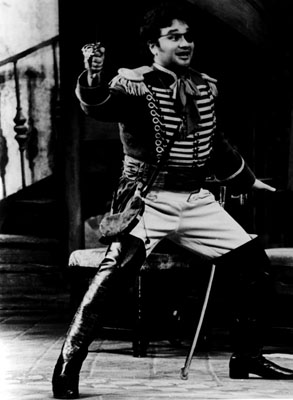 RV: No, no. [Chuckles.] But we have this falsetto,
which is like a yodel, and my theory is that a lot of the Mexican music is
coming from Austria. When Maximilian was emperor in Mexico in the last
century, he brought a lot of culture, and a lot of things. I spoke
with some people that made a study about this, and it's very possible that
this falsetto is coming from Austria. They said that when we sing these
huapango songs, like La Malagueña, [sings in a robust tone of voice,
jumping up a sixth to a high note, in yodeling fashion, on the "OOOO"]:
"Malague-OOOO-ña salerosa," this is like a falsetto, like yodel.
RV: No, no. [Chuckles.] But we have this falsetto,
which is like a yodel, and my theory is that a lot of the Mexican music is
coming from Austria. When Maximilian was emperor in Mexico in the last
century, he brought a lot of culture, and a lot of things. I spoke
with some people that made a study about this, and it's very possible that
this falsetto is coming from Austria. They said that when we sing these
huapango songs, like La Malagueña, [sings in a robust tone of voice,
jumping up a sixth to a high note, in yodeling fashion, on the "OOOO"]:
"Malague-OOOO-ña salerosa," this is like a falsetto, like yodel.
BD: I see. So there really is a unification of musics from all over the world.
[Photo at left: as Count Almaviva]
RV: Yeah. Yeah, exactly. It’s very interesting.
BD: Is it special for you, then, to perform and to record Mexican songs?
RV: For me it was very important to do it, because we have a huge variety of music. And then was difficult to put only 16 or 17 together on the disc. But this I am very happy about, and very proud. It is very beautiful. I like it.
BD: Are you at the point in your career that you want to be right now?
RV: I am perfect in my age. This is the first time in my life that I feel me perfect in my age! [Hearty laughter.] I want to stay there. I don't want to be younger; I don't want to be older. It's perfect like I am.
BD: Just stay here for now, forever.
RV: Yes, exactly.
BD: [Laughs.] But since you have to go on, do you like being booked several years in advance?
RV: Sometimes it's nice. You can plan and take care of what is the way of your voice. And sometimes it's not. Sometimes you ask yourself, "Oh, my God, why did I accept this? Sometimes you have, of course, problems of the life changing in some ways, and you cannot move the things. But I understand. I am agreeable.
BD: One last question: is singing fun?
RV: Oh, yes. I am singing only because I make fun. If not, I don't. I had a problem when I was young, when I was 23 years old before I started my singing career. My crisis was because I didn't have fun when I sang. I was better when my life turned and singing became fun. That was important for me. It was an important period, a hard period, but an important one.
BD: Good. I’m glad it worked out so well for you. Thank you for coming to Chicago.
RV: Thank you very much.
== == == == ==
-- -- -- -- --
== == == == ==
© 2000 Bruce Duffie, and posted on this website in October, 2006.
For more information about Ramón Vargas, visit his official website which has additional photos and video clips.
Winner of the ASCAP/Deems Taylor Award in 1991, Bruce Duffie was
an announcer/producer with WNIB, Classical 97 in
Chicago from 1975-2001. During that quarter-century, he conducted well
over a thousand interviews with classical musicians,
some of which were also published in various magazines and journals.
Now, a few of them are beginning to appear on this
website. He also continues his on-air work with series on WNUR-FM, and
on Contemporary Classical Internet Radio. For
more information, including a complete list of his guests and photos both
professional and personal, visit his website . He also
responds to serious E-Mail .